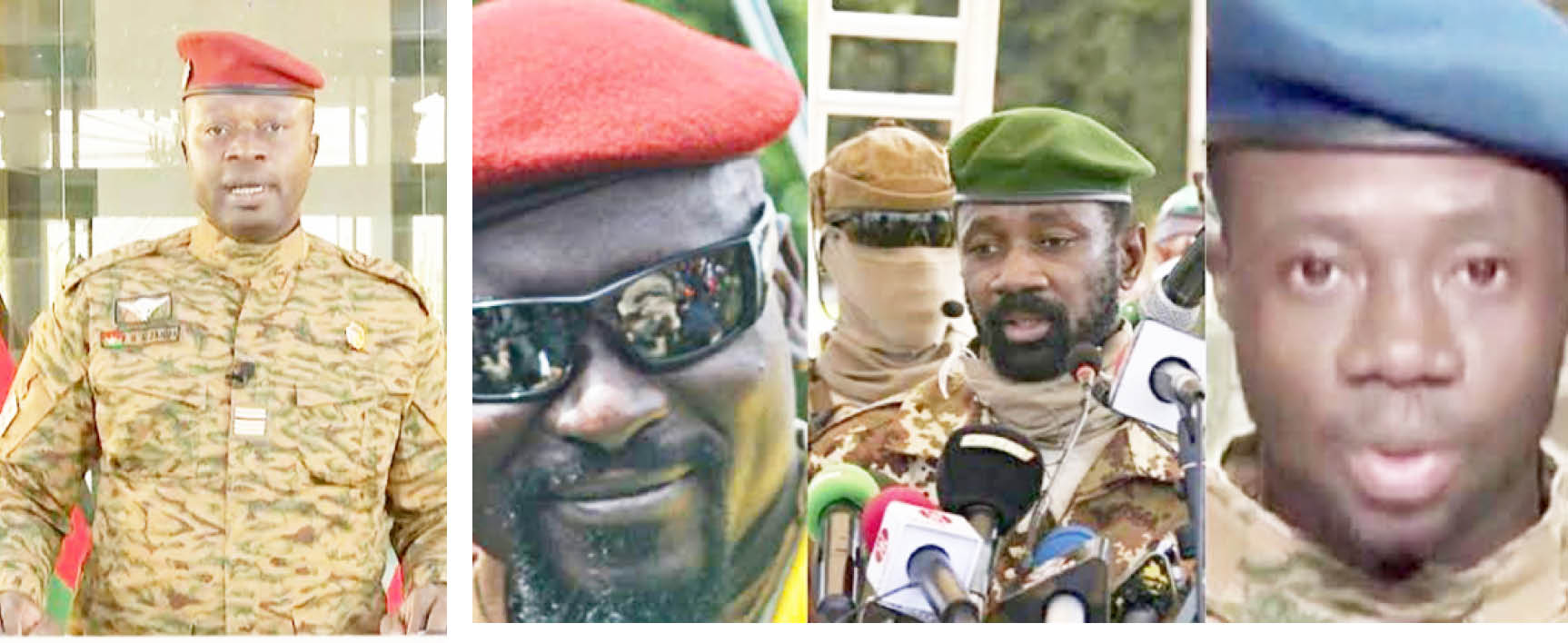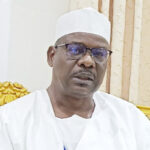The recent coup in Burkina Faso seems to have triggered high fears of military takeover in West and Central African countries. Daily Trust on Sunday examines the factors instigating the wave of coups in the continent?
In the last 18 months, four military takeovers have happened in the regions – two in Mali, one each in Sudan, Chad, Guinea, and the most recent attempt in Guinea Bissau last Tuesday.
In all these coups, the military claimed they toppled the democratically elected governments to save their countries from endemic corruption, insecurity and weak leadership.
Public reactions in the affected countries might be surprising, as citizens of Burkina Faso, for example, celebrated the military authorities, saying, “God has answered our prayers.”
Since 2015, Burkina Faso has been under the leadership of Roch Christian Kabore, during which an Islamist insurgency erupted and a large part of the country was destabilised by militants attacks.
Capitalising on that, the coup plotters, headed by Paul-Henri Sandaogo Damiba alleged that Kabore’s administration was incapable of fighting the war against militants, so his government was overthrown, with the support of the country’s civilians.
In the neighbouring Guinea, citizens last year jubilated when the democratically elected President Alpha Conde was deposed by the military, who accused his administration of entrenching “poverty and endemic corruption,” as well as “trampling on citizens’ rights.”
On August 20 and 21, 2021, opposition supporters flooded into Bamako’s Central Square and celebrated the coup in Mali. They also said it was “victory for the Mali people.”
The interim Malian president, Colonel Assimi Goita, promised to hold elections in a few months, but later sacked the transitional government and suggested they could run the country for the next five years.
Chad also saw a coup of sorts. The son of the late president, Idris Derby, seized power after his father was killed fighting rebels in N’djamena. The country is still under military rule.
In Sudan, protesters also celebrated when the long time ruler, Omar Al-Bashir, was ousted over tripling prices of bread and an economic crisis that led to shortage of basic goods. But they are now protesting for the return of power to a civilian government.
Many analysts believe that the way these countries are being governed has so much to do with all the recent coups. A classical example is Conde, the president of Guinea, who changed his country’s constitution to continue in office. This, according to them, must have triggered the coup, with the nod of civilians, to rectify the situation.
Others opined that the successive coups in Chad, Mali and Guinea and Burkina Faso were a wind of change, which only God can stop. It also weakened French influence on its former colonies and opened the door for Russia to fill the vacuum.
Professor Abdullahi Liman of the Department of International Relations, Nasarawa State University, warned that the coups would not only affect the francophone countries but Africa in general.
“In my perspective, it is a wind of change that has never been witnessed before. This is because it is almost unthinkable to say that a country like Mali and the rest of them would delink themselves from France despite its tighter policy of assimilation, which influences the political structure and culture of her former colonies.
“It is important to note that what these countries have done will encourage others to join. France will do everything possible to nip it in the bud; but again, people’s consciousness is indicating that if they don’t de-link with France, they are unlikely to attain the development they deserve because France controls virtually every aspect of their lives, including their currencies.
“So, in the next few months, if this consciousness becomes ingrained in the minds of more Africans, especially those from the francophone countries, something more far-reaching than revolution may happen. Honestly, this is my thinking,” he said.
A serving diplomat who doesn’t want to be named also corroborated what the university don expressed on the series of coups taking place in the continent.
He said that while many analysts concluded that it is a wind of change, the reasons given by all the coup plotters are a general indictment to almost all African countries.
He noted that the number of people being killed in countries where those coups took place was a child’s play compared to what is happening in some countries.
He said, “In some countries, people are being killed on a daily basis, and in hundreds.
“And wherever you are, believe it or not, soldiers are following it. It is a wind of change, just like when our countries got their independence, there was a famous speech by the then British Prime Minister Harold Macmillan about the wind of change. When it blows, nothing can stop it.”
He also noted that by sheer coincidence, the African Union (AU) had resolved, during the Agenda 2063 “About the Africa we want,” that by the 2020, Africa would succeed in ‘silencing the gun’. It’s a famous thing that the AU promoted.
“Unfortunately for the union, ‘silencing the gun’ was made impossible because even before these coups, within the backyard of the headquarters of the African Union (AU) in Ethiopia, Tigrey crisis erupted and distablised the country.
“As we speak today, the AU has changed the aspiration of ‘silencing the gun’ from 2020 to 2030. So there are too many contradictions,” he said.
On whether the sanctions slammed on countries where coups took place will make any impact, he said, “Sanctions on Guinea may be different from Burkina Faso and Mali. Don’t forget that Burkina Faso is a landlocked country; they don’t have access to anywhere unless by air. They don’t have a sea connection, so they can only get what is taken to them.
“So sanctions will work in Burkina Faso because if they are cut off, even the flights that stop-over in their airports will suspend operations. In a situation like that, there is nothing much they can do within themselves,” he said.
He, however, faulted the approach taken by the regional blocs to tame the coups, saying the leadership should have been more practical and serious about the situation.
“In fact, the leadership of the Economic Community of West African States (ECOWAS) should have gathered to meet physically, not virtually; and the delegation of Chiefs of Defense Staff of West African countries sent to the coup plotters in Burkina Faso to subordinate themselves to civil authority may hardly work,” he added.
Can ECOWAS and AU return the countries to democracy?
It is glaring that both the AU and ECOWAS have developed a lot of protocols on democracy and good governance, but they are more effective in condemning the military coups than enforcing better governance by rulers.
It has been observed that even civilian in some parts of the continent have been ruling their people for decades with no respect to the rule of law of their own countries, and some of them are the leaders of the regional blocs.
“You cannot actually expect those leaders to change anything because at the end, it is those head of states that actually make decisions.
“There is a credibility question on the leaders of the AU and ECOWAS now, such that people don’t believe in their capacity to consolidate democracy because they see it as they both make decisions for themselves. And they are not good examples of democratic governance of their own countries,” a diplomat said.
He also observed that the failure by the AU and ECOWAS to decisively deal with the coup plotters in the affected countries had emboldened others to topple more governments.
Now, with the series of coups across Africa, all eyes are on the remaining countries.

 Join Daily Trust WhatsApp Community For Quick Access To News and Happenings Around You.
Join Daily Trust WhatsApp Community For Quick Access To News and Happenings Around You.


